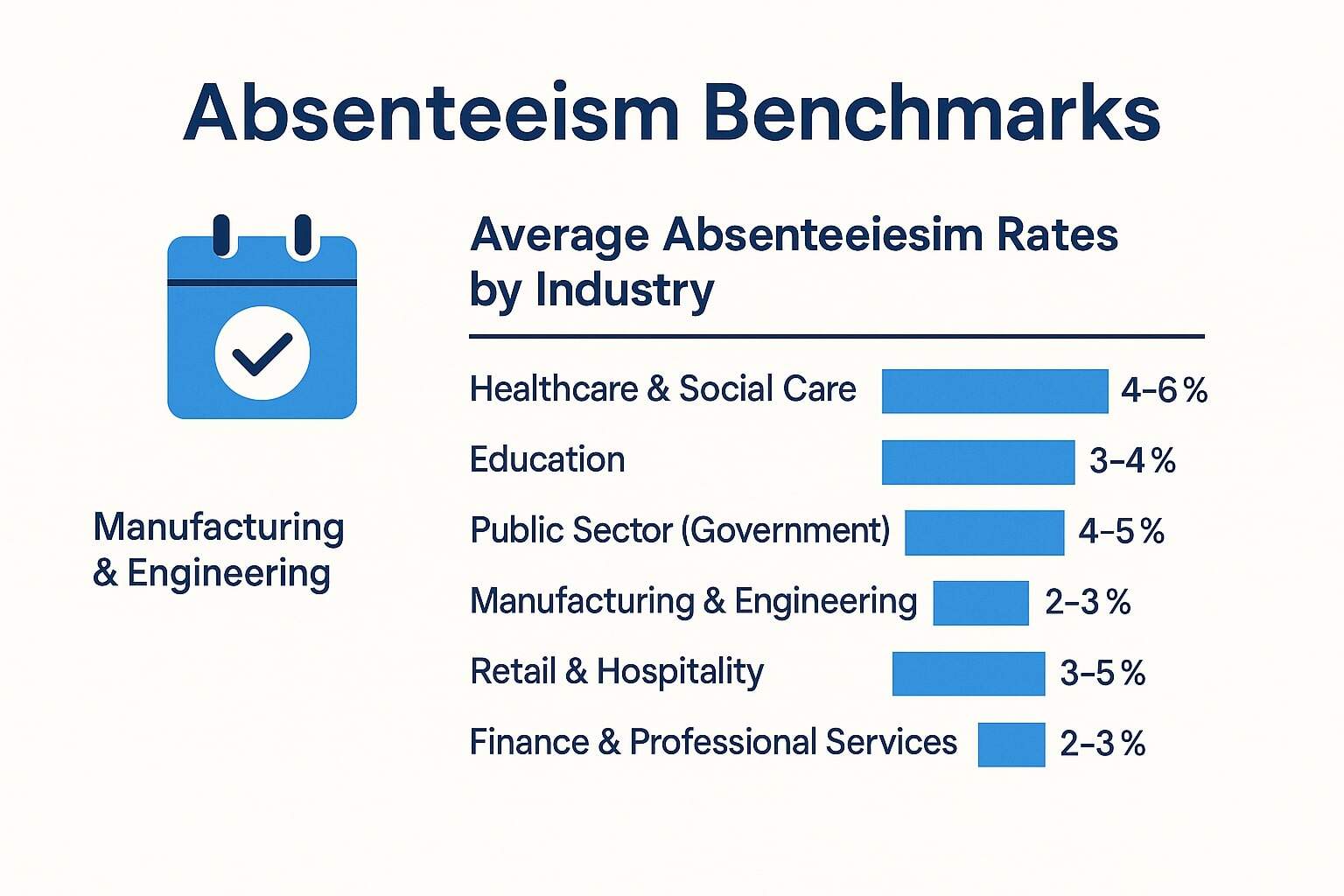How long can an employee be on sick leave before being sacked?

In our last post, we looked into the complications associated with sacking an employee that’s on sick leave. However, along with that issue, there’s also the related question of how long they’re allowed to be on leave before you can dismiss them, and the importance of understanding employment law in these situations. In this post, we delve into that point further.
Understanding Sickness Absence
Sickness absence refers to the period of time an employee is absent from work due to illness or injury. Managing sickness absence can be challenging for employers, as it can significantly impact business productivity and employee morale. Understanding the nuances of sickness absence is crucial for employers to develop effective strategies that support employees while minimizing disruptions to the business.
There are two main types of sickness absence: short-term and long-term. Short-term absence typically lasts for a few days or weeks and is often easier to manage. Long-term sickness absence, on the other hand, can extend for several months or even years and usually indicates a more serious health issue. To effectively manage both types of absences, employers should have a clear and comprehensive sickness absence policy in place. This policy should outline the procedures for reporting absences, the support available to employees, and the steps the company will take to manage and monitor absences.
How long can someone be on long term sickness absence before you can dismiss them?
The short answer to this question is that there’s no specific period of time that you have to wait before you’re allowed to dismiss an employee. If their prolonged absence goes against their terms of employment and your company’s absence policy, letting them go is a reasonable course of action.
However, when you decide to let an employee go for reasons related to sickness absence you need to tread lightly and carefully review available medical evidence. Depending on the circumstances of their dismissal, the employee may contest it at an employment tribunal. The success of their appeal mainly rests on two things:
Your sickness absence policy: If you have written terms that detail how your company handles sickness absence and how clear that policy is about the possibility of dismissal.
If you following the correct procedure: We covered this in greater detail when looking at dismissing an employee on sick leave, but in short:
Look for ways to support the employee: Did you communicate with the employee while they were off sick and offer support in aiding their return to work?
Look for alternatives: Did you explore alternative duties that the employee could carry out instead, until they’ve recovered from their illness?
Keep records: Did you keep records of your communication with the employee and your efforts to find alternatives to dismissal?
Before making a dismissal decision, it is crucial to obtain a medical report from a medical professional to assess the employee’s fitness to return to work.
Additionally, obtaining medical advice is essential to ensure compliance with legal obligations and to avoid potential claims of unfair dismissal.
Important milestones regarding statutory sick pay
While there isn’t a definitive amount of time that has to elapse before you sack an employee for being off sick, there are a couple of important time milestones that may factor dismissing them, including the necessity of providing a sick note if the absence exceeds seven days.
7 days (medical evidence required)
If an employee is office sick for more than 7 days in a row (inclusive of non-working days), they require a doctor’s note to confirm they aren’t fit for work. If an employee can provide this note after being absent and can resume their duties, there shouldn’t be any problem. In fact, some employees may produce a doctor’s note if they’ve been off for less than 7 days. Statutory sick pay can act as a temporary safety net for employees on long-term sick leave, impacting employer decisions regarding sick leave policies and the financial implications of paying out statutory sick pay for an extended period.
If they can’t – or won’t – provide a doctor’s note, you could dismiss them for excessive absence in accordance with your absence policy (depending on what it says). The more times an employee has violated your excessive absence policy in this way, the less likely they’ll be able to successfully contest their dismissal.
Now, if an employee has been off sick for fewer than 7 days, they need to self-certify that they’ve been off sick. To do this, they simply need to confirm they were absent for reasons of sickness via a method defined by the company (email, completing a form, etc).
However, you might encounter a scenario in which an employee is repeatedly off-sick for fewer than 7 days at a time – and never produces a doctor’s note. If you notice a pattern, which is all the more likely if you consistently track and manage staff absence, you’d need to talk to your employee about the situation. You may uncover an illness they didn’t initially want to disclose, which, at best, you can now support them through. Or, at worst, you may discover they weren’t genuine sickness absences and will have to discipline them according – whether it’s a written warning or something more severe.
Should chronic absences persist, be they for more or less than 7 days or backed or not backed by a doctor’s note, you have a right to dismiss an employee. You just need to explore alternatives to dismissal first and document everything to prove you explored said alternatives.
Four weeks
When someone has been off sick from work for four weeks or more, that can be defined as long-term sickness and may indicate ill health. At this point, it’s clear that the employee’s illness is serious and their return to work may not be straightforward. Your company will have to explore possible roles for the sick employee with the help of a medical expert, before you decide to let them go.
For employees who cannot return to work due to long-term health conditions, ill health retirement should be considered as an option. This should be formally included in company policies, and employees should consult with HR to ensure proper procedures are followed.
Employers must also consider the legal definition of ‘physical or mental impairment’ under the Equality Act 2010. Such conditions must have a substantial and long-term negative impact on daily activities to qualify as a disability.
Reasonable Adjustments and Support
Employers have a legal responsibility under the Equality Act to make reasonable adjustments to support employees with disabilities or long-term health conditions. These adjustments are essential to ensure that employees can continue to work effectively despite their health challenges. Reasonable adjustments can take many forms, such as modifying the employee’s job role, providing additional training or equipment, or making changes to the workplace environment.
To identify the most appropriate adjustments, employers should engage in open and supportive discussions with the affected employee. This collaborative approach can help pinpoint specific needs and tailor adjustments that facilitate the employee’s return to work. Examples of reasonable adjustments include implementing a phased return to work plan, offering flexible working arrangements, or providing access to counseling or therapy services. By making these adjustments, employers not only comply with legal requirements but also demonstrate a commitment to the well-being and inclusion of their workforce.
Phased Return to Work
A phased return to work plan is a structured approach that allows employees to gradually transition back to their job role after a period of sickness absence. This plan is particularly beneficial for employees recovering from long-term sickness, as it provides a supportive and manageable way to reintegrate into the workplace. The phased return to work plan should be tailored to the individual employee’s needs, taking into account their specific health condition and recovery progress.
Developing a phased return to work plan involves collaboration between the employer, the employee, and, if necessary, medical professionals. The plan may include a combination of part-time work, flexible working arrangements, and job modifications to accommodate the employee’s current capabilities. Regular meetings should be scheduled to monitor the employee’s progress and make any necessary adjustments to the plan. This ongoing support helps ensure a smooth and successful return to work, benefiting both the employee and the organization.
Alternative Options to Dismissal
Before considering dismissal due to sickness absence, employers should explore all possible alternative options to support the employee. Dismissal should be a last resort, as it can have significant negative impacts on the employee’s well-being and may lead to claims of unfair dismissal. Instead, employers should focus on finding ways to accommodate the employee’s needs and facilitate their return to work.
Alternative options to dismissal include offering different work arrangements, such as part-time or remote work, providing additional training or support, and making reasonable adjustments to the employee’s job role. Employers should also consider the availability of counseling or therapy services, employee assistance programs, and flexible working arrangements. By exploring these alternatives, employers can support the employee’s recovery and reintegration into the workplace, demonstrating a commitment to their well-being and potentially avoiding the legal and ethical complications associated with dismissal.



